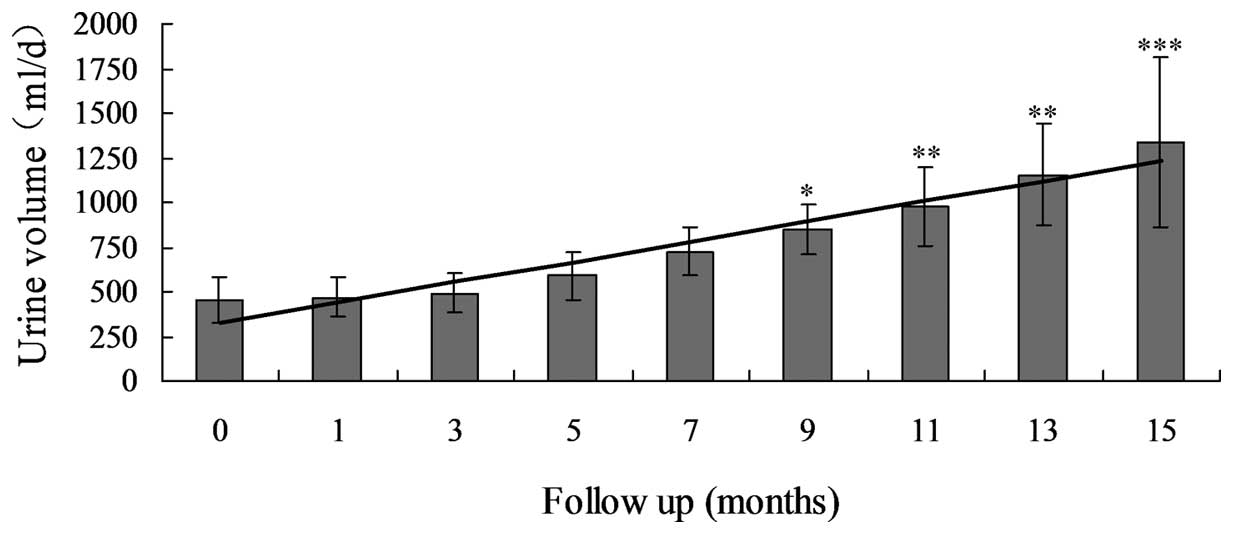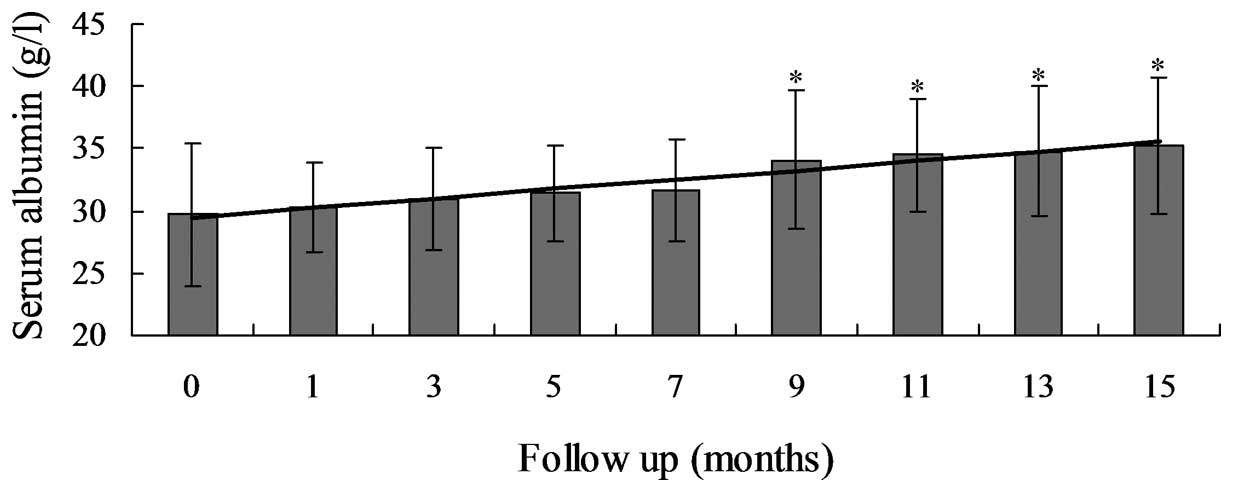|
1
|
Zhu X, Li F, Yang B, Liang J, Qin H and Xu
J: Effects of ultraviolet B exposure on NDA methylation in patients
with systemic lupus erythematosus. Exp Ther Med. 5:1219–1225.
2013.PubMed/NCBI
|
|
2
|
Fayaz A, Pirson Y, Cosyns JP, Yango L and
Lambert M: Pauci-immune necrotizing and crescentic
glomerulonephritis in a patient with systemic lupus erythematosus.
Clin Nephrol. 69:290–293. 2008. View
Article : Google Scholar : PubMed/NCBI
|
|
3
|
Rao L, Liu G, Li C, Li Y, Wang Z, Zhou Z,
Tong S and Wu X: Specificity of anti-SSB as a diagnostic marker for
the classification of systemic lupus erythematosus. Exp Ther Med.
5:1710–1714. 2013.PubMed/NCBI
|
|
4
|
Soni S and Saboo S: High-volume peritoneal
dialysis in acute kidney injury. Kidney Int. 75:11192009.
View Article : Google Scholar : PubMed/NCBI
|
|
5
|
Ren W, Chen W, Pan HX, Lan L, Wang P,
Huang YH, Kong M and Wang K: Clinical application of right
low-position modified peritoneal dialysis catheterization. Exp Ther
Med. 5:457–460. 2013.PubMed/NCBI
|
|
6
|
Rietveld A and Berden JH: Renal
replacement therapy in lupus nephritis. Nephrol Dial Transpl.
23:3056–3060. 2008. View Article : Google Scholar
|
|
7
|
Zhang ZY, Zhou CH, Li MX and Yu YW:
Long-term efficacy of intermittent peritoneal dialysis using
various doses. Exp Ther Med. 3:519–524. 2012.PubMed/NCBI
|
|
8
|
Shaw LM, Nicholls A, Hale M, Armstrong VW,
Oellerich M, Yatscoff R, Morris RE, Holt DW, Venkataramanan R,
Haley J, Halloran P, Ettenger R, Keown P and Morris RG: Therapeutic
monitoring of mycophenolic acid. A consensus panel report. Clin
Biochem. 31:317–322. 1998. View Article : Google Scholar : PubMed/NCBI
|
|
9
|
Wang A, Wang Y, Wang G, Zhou Z and Yang X:
Infective endocarditis associated with acute renal railure: Repeat
renal biopsy and successful recovery. Exp Ther Med. 1:433–436.
2010. View Article : Google Scholar : PubMed/NCBI
|
|
10
|
Chionh CY, Ronco C, Finkelstein FO, Soni
SS and Cruz DN: Acute peritoneal dialysis: what is the ‘adequate’
dose for acute kidney injury? Nephrol Dial Transplant.
25:3155–3160. 2010. View Article : Google Scholar : PubMed/NCBI
|
|
11
|
Stenvinkel P, Chung SH, Heimbürger O and
Lindholm B: Malnutrition, inflammation, and atherosclerosis in
peritoneal dialysis patients. Perit Dial Int. 21(Suppl 3):
S157–S162. 2001.PubMed/NCBI
|
|
12
|
Li L, Wang R, Shi HH, Xie L, Li JD, Kong
WC, Tang JT, Ke DN and Zhao LY: In vitro study on the feasibility
of magnetic stent hyperthermia for the treatment of cardiovascular
restenosis. Exp Ther Med. 6:347–354. 2013.PubMed/NCBI
|
|
13
|
Takahashi T, Kubota M, Nakamura T, Ebihara
I and Koide H: Interleukin-6 gene expression in peripheral blood
mononuclear cells from patients undergoing hemodialysis or
continuous ambulatory peritoneal dialysis. Ren Fail. 22:345–354.
2000. View Article : Google Scholar : PubMed/NCBI
|
|
14
|
Coplon NS, Diskin CJ, Petersen J and
Swenson RS: The long-term clinical course of systemic lupus
erythematosus in end-stage renal disease. N Engl J Med.
308:186–190. 1983. View Article : Google Scholar : PubMed/NCBI
|
|
15
|
Cheigh JS and Stenzel KH: End-stage renal
disease in systemic lupus erythematosus. Am J Kidney Dis. 21:2–8.
1993. View Article : Google Scholar : PubMed/NCBI
|
|
16
|
Zhou F, Ji J, Song Q, Peng Z, Zhang G and
Wang Y: Pulmonary fat embolism and related effects during femoral
intramedullary surgery: An experimental study in dogs. Exp Ther
Med. 6:469–474. 2013.PubMed/NCBI
|
|
17
|
Gabriel DP, Caramori JT, Martin LC,
Barretti P and Balbi AL: Continuous peritoneal dialysis compared
with daily hemodialysis in patients with acute kidney injury. Perit
Dial Int. 29(Suppl 2): S62–S71. 2009.PubMed/NCBI
|
|
18
|
Rodby RA, Korbet SM and Lewis EJ:
Persistence of clinical and serologic activity in patients with
systemic lupus erythematosus undergoing peritoneal dialysis. Am J
Med. 83:613–618. 1987. View Article : Google Scholar : PubMed/NCBI
|
|
19
|
Altieri P, Sau G, Cao R, Barracca A,
Menneas A, Micchittu B, Cabiddu G, Esposito P and Pani A:
Immunosuppressive treatment in dialysis patients. Nephrol Dial
Transplant. 17(Suppl 8): 2–9. 2002. View Article : Google Scholar : PubMed/NCBI
|
|
20
|
Siu YP, Leung KT, Tong MK, Kwan TH and Mok
CC: Clinical outcomes of systemic lupus erythematosus patients
undergoing continuous ambulatory peritoneal dialysis. Nephrol Dial
Transplant. 20:2797–2802. 2005. View Article : Google Scholar : PubMed/NCBI
|
|
21
|
Tachaudomdach C, Kantachuvesiri S,
Changsirikulchai S, Wimolluck S, Pinpradap K and Kitiyakara C:
Connective tissue growth factor gene expression and decline in
renal function in lupus nephritis. Exp Ther Med. 3:713–718.
2012.PubMed/NCBI
|
|
22
|
Weng CH, Hsu CW, Yu CC, Yen TH, Yang CW
and Hung CC: Peritoneal dialysis and hemodialysis in systemic lupus
erythematosus patients: comparison of clinical outcomes. Kidney
Blood Press Res. 32:451–456. 2009. View Article : Google Scholar : PubMed/NCBI
|
|
23
|
Liang CC, Huang CC, Wang IK, Chang CT,
Chen KH, Weng CH, Lin JL, Hung CC, Yang CW and Yen TH: Impact of
renal survival on the course and outcome of systemic lupus
erythematosus patients treated with chronic peritoneal dialysis.
Ther Apher Dial. 14:35–42. 2010. View Article : Google Scholar : PubMed/NCBI
|
|
24
|
Andrews PA, Warr KJ, Hicks JA and Cameron
JS: Impaired outcome of continuous ambulatory peritoneal dialysis
in immunosuppressed patients. Nephrol Dial Transplant.
11:1104–1108. 1996. View Article : Google Scholar : PubMed/NCBI
|
|
25
|
Odama UO, Shih DJ and Korbet SM:
Sclerosing peritonitis and systemic lupus erythematosus: a report
of two cases. Perit Dial Int. 19:160–164. 1999.PubMed/NCBI
|
|
26
|
Szakszon K, Csízy I and Szabó T: Early
introduction of peritoneal dialysis may improve survival in severe
sepsis. Pediatr Emerg Care. 25:599–602. 2009. View Article : Google Scholar : PubMed/NCBI
|

















